Dec 20, 2017 | Focolare Worldwide
Towards Christmas “I knew that the company I was working for would soon close shop and I would soon be jobless. Despite this, as Christmas neared, my colleagues and I thought of setting aside a part of our salary for the poorer people. So we went to visit a family that lived in a shanty, deprived of all necessities. Besides the envelope with the money we also brought toys for the children. We departed happily: it seemed to us that it was best preparation for the birth of the Lord. But before the day ended, some good news arrived: we were ensured that we would work for another five months.” (J.L.V. – Mexico) Hunger «One day at school, I saw a little girl who was all alone in a corner. I immediately went and asked her, “Why are you crying?” She told me that she had stomach ache because she had not had breakfast and had nothing for lunch. I thought: “It is Jesus who is hungry” and gave her my sandwich. After a while that girl said to me: “Now my stomach is no longer aching.” I was so happy. (S.S – Philippines) I forgive! «I was playing with a friend of mine when a boy arrived and with no reason hit me on the head, and I had to go to the hospital to be treated. On returning home I had only one thought: revenge. The day after, that boy’s father came to ask forgiveness. And he added: “I give you my permission to do to my son what he did to you. Perhaps he will understand how badly he behaved!” At that point I remembered Jesus’s invitation to love one’s enemies and I answered him that I forgave him. Surprised, the father called his son, and so we made up and now live in peace.” (Dionisio – Angola) Stolen drillers While I was working in the office together with my colleague, Benda, who is Muslim, we heard a crash from outside. We went to look: someone had broken the glass of our van and had stolen three drillers. It was the first time a thing like that happened and we were inconsolable. Then the thought of forgiving the author of that act came to my mind, and who probably was pushed by necessity. Recalling a phrase of the Koran Benda added: “When a person forgives, what he was robbed of will be returned by someone else.” That evening, at home, while I was recounting the episode, one of my relatives offered me three drills which he wasn’t using anymore. The next day, he brought them, and one of them was similar to the more expensive drill that had been stolen. (A.G. – Italy)
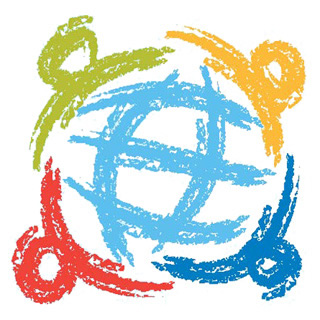
Dec 20, 2017 | Non categorizzato
 Instituted by the United Nations in 2005, and proclaimed on 20 December 2002, the world Solidarity Fund was created with the aim of promoting human and social development in the developing countries. Solidarity Day calls attention to respect for diversity and the importance of solidarity between people. If united and solid, humankind can more effectively oppose social injustice. Solidarity conceived as an understanding of the fundamental and universal values of human existence has to become the basis of the search for global solutions, and may carry out a decisive role in solving the world’s problems. Solidarity is indicated as the protagonist in the Millennium Declaration signed in September 2000 by all the member states of the UN, to counter economic, social, cultural and humanitarian injustice. The declaration elects such values as the pillar of international relationships in the 21st century.
Instituted by the United Nations in 2005, and proclaimed on 20 December 2002, the world Solidarity Fund was created with the aim of promoting human and social development in the developing countries. Solidarity Day calls attention to respect for diversity and the importance of solidarity between people. If united and solid, humankind can more effectively oppose social injustice. Solidarity conceived as an understanding of the fundamental and universal values of human existence has to become the basis of the search for global solutions, and may carry out a decisive role in solving the world’s problems. Solidarity is indicated as the protagonist in the Millennium Declaration signed in September 2000 by all the member states of the UN, to counter economic, social, cultural and humanitarian injustice. The declaration elects such values as the pillar of international relationships in the 21st century.
Dec 19, 2017 | Non categorizzato
It no longer seems paradoxical to have to reinsert Jesus into Christmas. During this season, especially in affluent countries, consumerism and a certain sentimentalism blur or even exclude the centrality of Jesus. It wasn’t very different two thousand years ago: On their way to Bethlehem, they couldn’t find a place to stay. Mary and Joseph had to make do with a makeshift shelter where the Child could be born. All over the world the Gen4 are saying:“They’ve evicted Jesus.” “At least in our homes, let’s celebrate as loud as we can the One who is born!” Chiara Lubich invited them to “let Jesus be born in their midst, through love.” This led to the idea in 1996 of making small statues of the Baby Jesus and giving them away to people rushing by on the streets, perhaps mindless of the fact that Christmas was primarily a celebration of Jesus. “We tell the people: ‘Do you want to take Him home to your house?’ Some say no, some move on without even stopping. But others stop and we give them these small statues, or the mangers we made. In the squares of big cities, in the commercial centres, in the homes for the elderly – our booths draw people’s attention . . . or the parties we organize for children. It’s like a wave of happiness that overcomes everybody and places, Jesus, the One we’re really celebrating, at the centre of Christmas.” Before trying to give Jesus to other people, the children try to know him better. A two-day meeting for Gen4 was held recently in the Focolare town, in Tagaytay, Philippines. At the end everyone wrote a letter to Jesus. Sam wrote: “Jesus is my hero. Whenever I’m afraid, he protects me. When I’m good to other people, I’m like him.” Kenneth: “I pray to you that my family will not separate.” Gioia writes about having learned how to love everyone, “even my enemies, to be the first to love, sharing the joys and sorrows of others.” April: “Thank you for giving me parents and a good sister.” In many parts of the world they are challenging the cold, the problems and indifference with a disarming smile, candour and warmth that is typical of their age. The Gen4 present an unedited view onto Christmas, returning the attention to its real meaning. In Central America Christmas the Gen4 from El Salvador the Dominican Republic celebrated with the Posadas that recall the difficulty Mary and Joseph had in finding a place to stay. Eight-year-old Walter Francisco is an active member of the Gen4: “Offering our Jesus to all the people who came by us, was really very nice!” Adriana and Juan Pablo are nine and six year old brothers. “First we went to a home for orphan children and share a meal with them. Then we went to give away our Baby Jesus, and the money that some people gave to us we gave to the poor.” «Li abbiamo portati anche ai bambini che puliscono i vetri delle macchine ai semafori». The local Focolare community of Santa Tecla held a food and toy drive for the occasion. More than forty children worked on making 270 statues of the Niñito, which they made with much love and care and offered to shoppers on the street, in several parishes and in a kindergarten: “Jesus can be born again today in everyone’s hearts,” they told us. The money donated, was sent to the children of Puerto Rico.
Dec 18, 2017 | Non categorizzato
Dec 18, 2017 | Non categorizzato
In the year 2000 the General Assembly of the United Nations declared December 18th International Migrants Day. Ten years before, on the same day, it had approved an international convention on the protection of the rights of migrant workers, following a serious road accident in which twenty eight migrant workers had lost their lives beneath the tunnel of Monte Bianco while they were travelling to France in search of work, hidden in a truck. Migrants Day deals with a topic that is not new to the story of the human race, but in recent years it has taken on a global relevance, especially in the West. Last 30th September, addressing an Association that brings together Italian Communes, Pope Bergoglio remarked: “We need a politics that doesn’t leave the people who arrive in our region to be left on the margins,” but for this to happen “there have to be spaces for personal encounter and mutual understanding.”
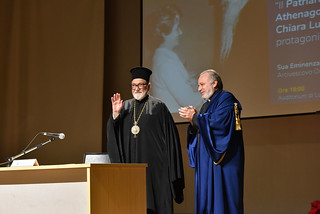
Dec 18, 2017 | Non categorizzato
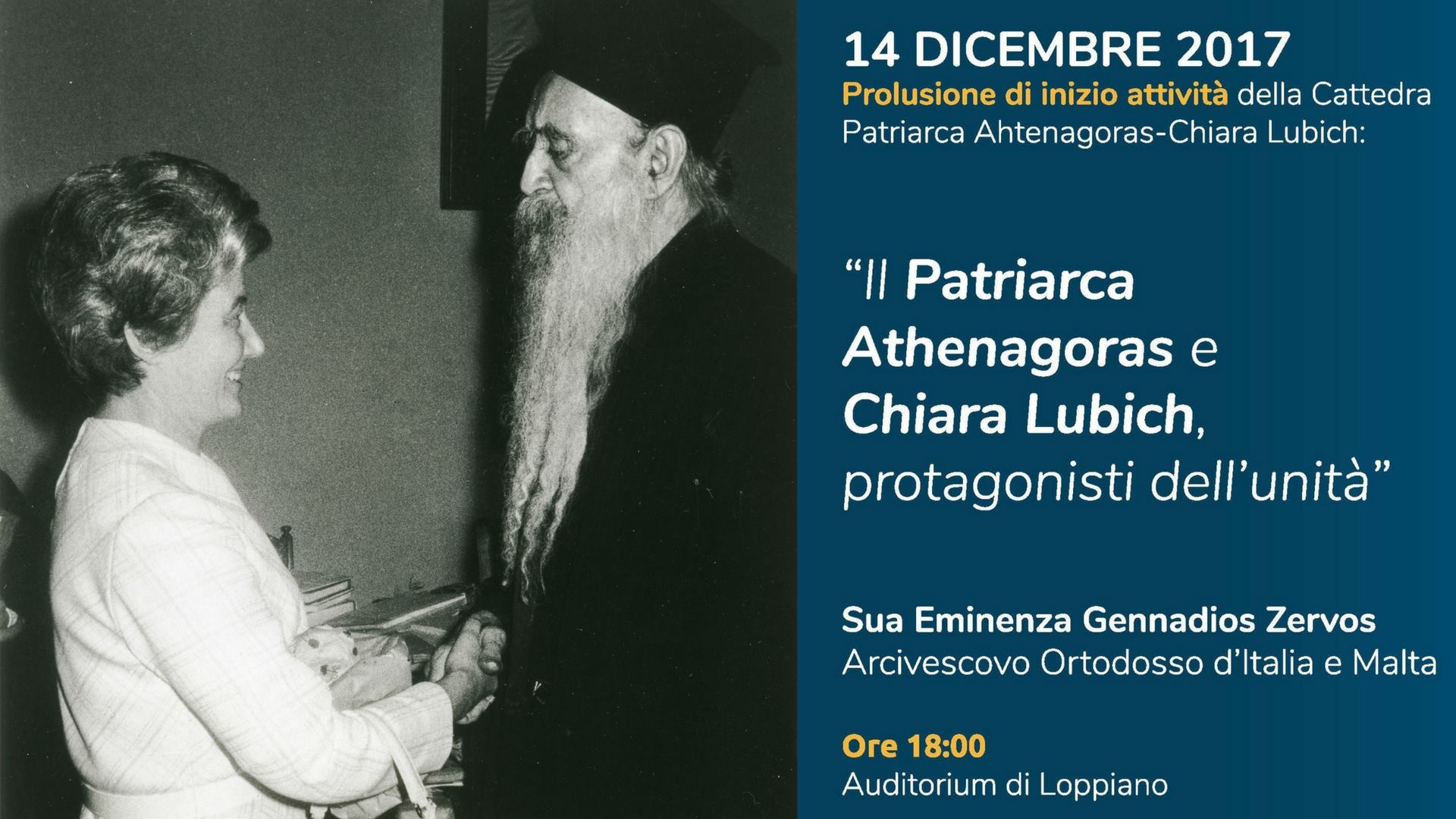 It is quite unique on the academic, international and cultural landscape and against the backdrop of a crisis of the political, social and religious equilibrium in the Near and Middle East, and between the shores of the Mediterranean: the institution of an ecumenical Chair named for Patriarch Athenagoras and for Chiara Lubich that stands as a sign of that Europe which still wants to breathe with “both lung It was inaugurated last December 14th within the context of the international town of Loppiano, not far from Florence and its call to universalism. The nearby city of central Italy boasts of a long tradition of reconciliation between the East and the West that goes back to the middle of the fifteenth century. Instituted jointly by the Catholic Church, represented by Archbishop of Florence, Cardinal Betori, and by the Orthodox Church, represented by Orthodox Archbishop of Italy and Malta, Gennadios Zervos, the Chair will examine the cultural significance and social implications of the ecumenical journey towards the full unity of the Christian Churches of the East and of the West in highly qualified environment like Sophia University Institute (IUS) where reflection and the dialogue of life are strictly united and experienced.
It is quite unique on the academic, international and cultural landscape and against the backdrop of a crisis of the political, social and religious equilibrium in the Near and Middle East, and between the shores of the Mediterranean: the institution of an ecumenical Chair named for Patriarch Athenagoras and for Chiara Lubich that stands as a sign of that Europe which still wants to breathe with “both lung It was inaugurated last December 14th within the context of the international town of Loppiano, not far from Florence and its call to universalism. The nearby city of central Italy boasts of a long tradition of reconciliation between the East and the West that goes back to the middle of the fifteenth century. Instituted jointly by the Catholic Church, represented by Archbishop of Florence, Cardinal Betori, and by the Orthodox Church, represented by Orthodox Archbishop of Italy and Malta, Gennadios Zervos, the Chair will examine the cultural significance and social implications of the ecumenical journey towards the full unity of the Christian Churches of the East and of the West in highly qualified environment like Sophia University Institute (IUS) where reflection and the dialogue of life are strictly united and experienced. 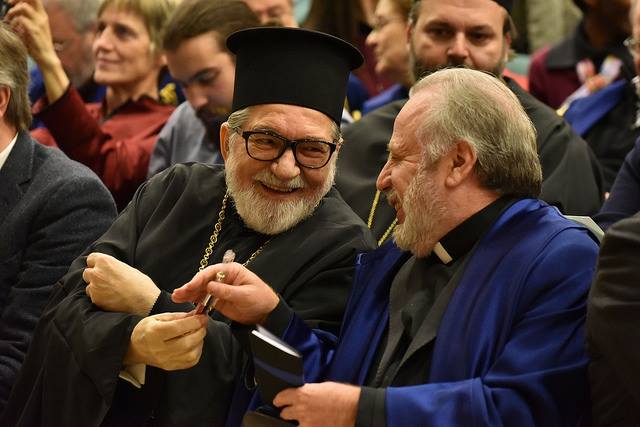 The idea of an ecumenical Chair came up in 2015, when IUS with the approval and applause of Pope Francis, had awarded the first honorary doctorate in the Culture of Unity to the Ecumenical Patriarch of Constantinople Bartholomew I. “On that occasion,” IUS explains, “the desire came out of instituting an Ecumenical Chair named after Patriarch Athenagoras and after Chiara Lubich, which would revisit and actualize that spiritual heritage.” The Chair, of which IUS president, Piero Coda and Metropolitan of Selyvria, Hi Eminence Maximos Vgenopoulos, are co-holders, was inaugurated in the persence of the Metropolitan of Italy and Malta, Gennadios Zervos. “Patriarch Athenagoras and Chiara Lubich are two worthy and blessed personalities that God had illumined,” said the Metropolitan, “to destroy the religious emnities and divisions. With their encounter, they restored the friendship and launched the ‘Dialogue of Charity’.” He went on to say, “I believe that Chiara, with her spirituality, had prepared the two main and most valuable Bridges: the first is Paul VI, the second Athenagoras.”
The idea of an ecumenical Chair came up in 2015, when IUS with the approval and applause of Pope Francis, had awarded the first honorary doctorate in the Culture of Unity to the Ecumenical Patriarch of Constantinople Bartholomew I. “On that occasion,” IUS explains, “the desire came out of instituting an Ecumenical Chair named after Patriarch Athenagoras and after Chiara Lubich, which would revisit and actualize that spiritual heritage.” The Chair, of which IUS president, Piero Coda and Metropolitan of Selyvria, Hi Eminence Maximos Vgenopoulos, are co-holders, was inaugurated in the persence of the Metropolitan of Italy and Malta, Gennadios Zervos. “Patriarch Athenagoras and Chiara Lubich are two worthy and blessed personalities that God had illumined,” said the Metropolitan, “to destroy the religious emnities and divisions. With their encounter, they restored the friendship and launched the ‘Dialogue of Charity’.” He went on to say, “I believe that Chiara, with her spirituality, had prepared the two main and most valuable Bridges: the first is Paul VI, the second Athenagoras.” 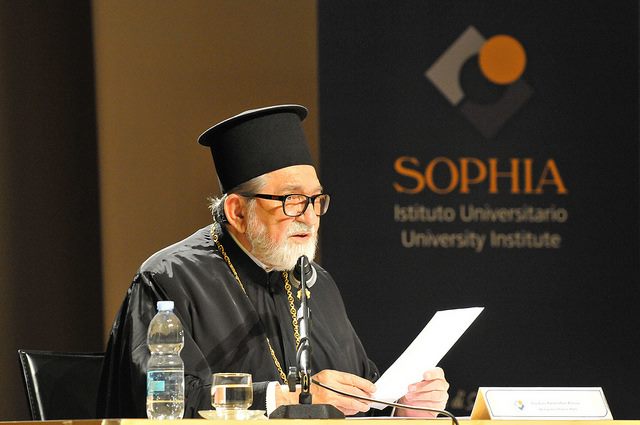 Pope Frances sent a message for the occasion: “I rejoice for this praiseworthy initiative, aimed at memorializing the encounter between the Ecumenical Patriarch and the foundress of the Focolare Movement, which fifty years ago marked the beginning of a prolific journey of mutual collaboration and understanding, which boasts of many fruits today, among them, fraternal friendship.” “Such an academic project,” said Focolare president, Maria Voce, “represents an important moment in the ecumenical relations that are in place between the Sister Churches of East and West, and opens fascinating prospectives for the field of study, centered on respectful dialogue, that promises to be even more enriching as a mutual gift on the level of theology and for an anthropology of communion.”
Pope Frances sent a message for the occasion: “I rejoice for this praiseworthy initiative, aimed at memorializing the encounter between the Ecumenical Patriarch and the foundress of the Focolare Movement, which fifty years ago marked the beginning of a prolific journey of mutual collaboration and understanding, which boasts of many fruits today, among them, fraternal friendship.” “Such an academic project,” said Focolare president, Maria Voce, “represents an important moment in the ecumenical relations that are in place between the Sister Churches of East and West, and opens fascinating prospectives for the field of study, centered on respectful dialogue, that promises to be even more enriching as a mutual gift on the level of theology and for an anthropology of communion.”  The long story of friendship and cooperation with the Ecumenical Patriarchate of Constantinople reaches back to June 1967 when Chiara Lubich first met Patriarch Athenagoras. “It is a great thing to know each other,” the Patriarch had confided to her. “For many centuries we lived isolated, without having brothers, without having sisters – like orphans! The first ten centuries of Christianity were for the dogmas and for organizing the Church. In the ten centuries that followed we had the schisms – the divisions. The third era – this one – is the era of love.” Conferences, classes and a Summer School for young Catholics, Orthodox, Jews and Muslims are scheduled for this academic year. Next March a series of lessons will be given on The Ecclesiology of the Orthodox Church and the Path of Ecumenical Dialogue with the Catholic Church,” for students who would like to contribute to the promotion of the full unity, in service to the encounter between peoples and cultures. Foto Flickr
The long story of friendship and cooperation with the Ecumenical Patriarchate of Constantinople reaches back to June 1967 when Chiara Lubich first met Patriarch Athenagoras. “It is a great thing to know each other,” the Patriarch had confided to her. “For many centuries we lived isolated, without having brothers, without having sisters – like orphans! The first ten centuries of Christianity were for the dogmas and for organizing the Church. In the ten centuries that followed we had the schisms – the divisions. The third era – this one – is the era of love.” Conferences, classes and a Summer School for young Catholics, Orthodox, Jews and Muslims are scheduled for this academic year. Next March a series of lessons will be given on The Ecclesiology of the Orthodox Church and the Path of Ecumenical Dialogue with the Catholic Church,” for students who would like to contribute to the promotion of the full unity, in service to the encounter between peoples and cultures. Foto Flickr
Dec 17, 2017 | Non categorizzato
On Sunday, December 17th, Pope Francis will turn 81. He is in good health and working with great intensity. As everyone knows, he recently returned from a very demanding trip to Myanmar and Bangladesh and is preparing for his 22cnd trip to Chile and Peru in January. Last year, on his 80th birthday, he confided: “For several days a word has been coming to my mind that can sound bad: old age. It frightens. At least it gives a little scare. But when you see it as a phase of life that is meant to give joy, wisdom, hope – then you can start to live again.” With great gratitude for the gift his life has been, all focused on loving God and people, with a special preference for the most weak and marginalized, we wish him our most heartfelt happy birthday wishes. We assure him of our daily prayers as we ask the Holy Spirit to give hims strength and light to carry foward his task with peace for the joy of all. https://youtu.be/WMVIMp7Eg8I
Dec 16, 2017 | Non categorizzato
Today the warmth of Christmas makes us all feel more like a family, more one and more like true brothers and sisters who share everything, both joys and sorrows. Above all, we want to share the pain of those who, through various circumstances, are spending this Christmas in direct contact with suffering. … If we look at suffering from a human standpoint, we are tempted to find causes for it either within or outside of us, for example in other people’s wrongdoing, in nature or other things…. We say that accident is John’s fault; that illness is my fault; that painful situation/trial came about because of Jane…. All this can be true, but if we think only in these terms, we forget the most important thing. We lose sight of the fact that God love’s underpins all that happens to us. God wills or permits everything for a higher purpose, which is our own good. So then, what can we say to people struggling with suffering? What Christmas wishes can we offer them? How can we relate to them? First, let’s approach them with the greatest respect. Even though they may not think so, at this very moment God is at their side. Then let’s share their crosses as far as we can. Let’s assure them that we are always with them and praying for them, so that they may be able to take what distresses and causes them pain directly from the hands of God. … Let’s help them bear in mind the value of suffering and remind them of the marvellous Christian principle in our spirituality that helps us see a countenance of Jesus crucified and forsaken in suffering and, by loving him, transform it into joy. Knowing that those who walk in God’s ways cannot escape suffering, our Christmas wishes might be that everyone may know how to welcome all the small or great sufferings they encounter with great love and present them as a gift for the Child Jesus born today, just as the three kings offered their gifts. It will be the best incense, the best gold, and the best myrrh that we could place in the nativity scene. Chiara Lubich, 25 December 1986
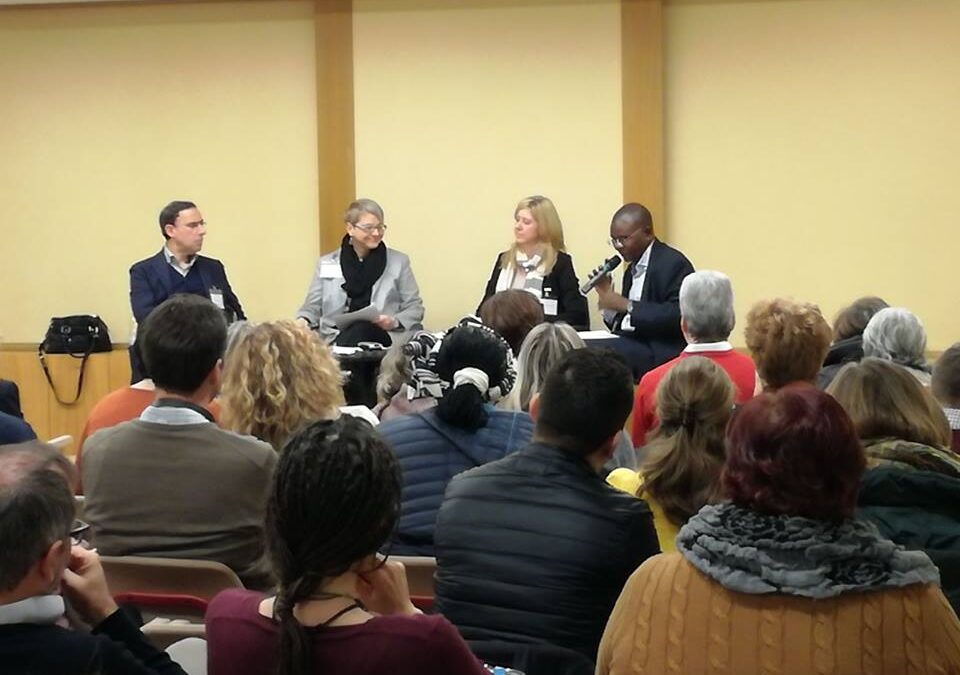
Dec 15, 2017 | Focolare Worldwide
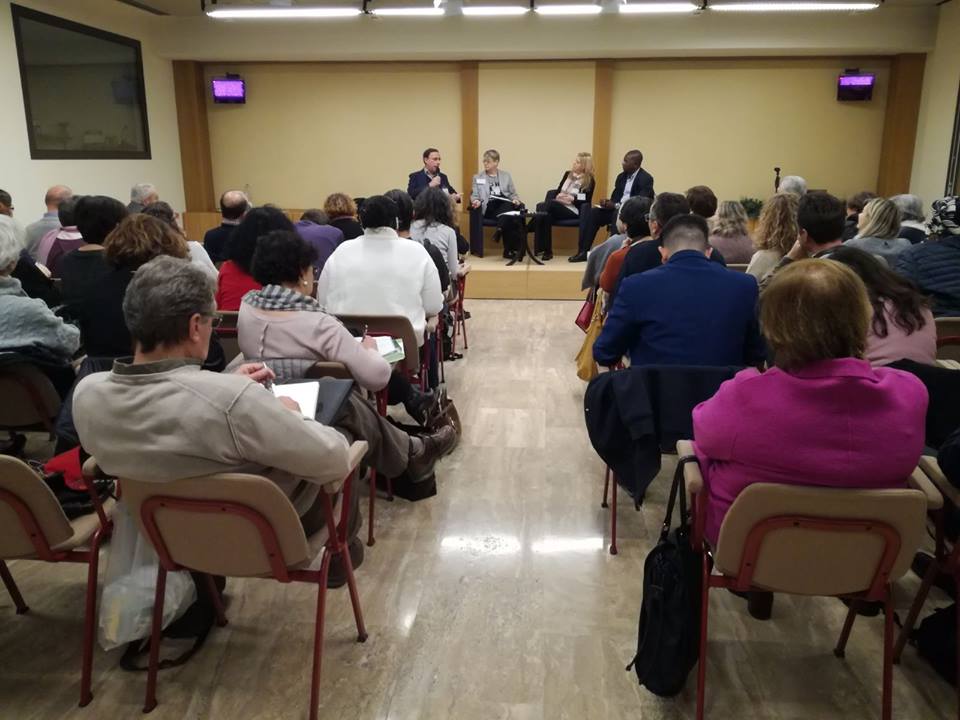 “For as much as Africa is rich, the others seem to benefit more from its riches. In granting contracts to multinationals for the extraction of minerals, for example, there is a play of interests, in which ’compensations’ and ‘compromises,’ ‘agreements’ and ‘thanks’ have as a consequence the exploitation of the producing country, without a real improvement in raising the population’s living conditions.” Raphael Takougang, a Cameroon lawyer of Communion and Law, harshly portrays a picture of the reality of life in Africa today: “Corruption in Africa is not only the work of single citizens, but is above all a consolidated method with which the economic powers “create” and support tyrants as long as these protect their interests, with the silent complicity of the international community.” And it is always the poor who pay for this. Takougang does not limit himself to mere denunciations, but rather, despite everything, shows his optimism ‘because there is a new generation of political leaders in Africa rising up, and has realised that mainly the citizens will have to control the actions of those governing them… to ensure the defense of the African people’s fundamental rights to life, education, health, and spiritual and material wellbeing.” Patience Lobé, an engineer – world head who together with the volunteers are the driving force of New Humanity – during her entire mandates as an officer of the Ministry of Public Works in Cameroon had been seriously threatened: «For the African concept of solidarity anyone who is in need has to be satisfied. For this reason people continually came to my office, to ask for work, or to request a subsidy. During my permanence as head of the office, not one day passed in which I was not subject to temptations or threats. Corruption is a widespread, contaminative virus, difficult to eliminate. Like all viruses, a vaccine is needed in order to eradicate it. The vaccine may be represented by a real change in mentality: education in a culture other than consumerism which considers the owning of goods and possession as the only road to happiness.”
“For as much as Africa is rich, the others seem to benefit more from its riches. In granting contracts to multinationals for the extraction of minerals, for example, there is a play of interests, in which ’compensations’ and ‘compromises,’ ‘agreements’ and ‘thanks’ have as a consequence the exploitation of the producing country, without a real improvement in raising the population’s living conditions.” Raphael Takougang, a Cameroon lawyer of Communion and Law, harshly portrays a picture of the reality of life in Africa today: “Corruption in Africa is not only the work of single citizens, but is above all a consolidated method with which the economic powers “create” and support tyrants as long as these protect their interests, with the silent complicity of the international community.” And it is always the poor who pay for this. Takougang does not limit himself to mere denunciations, but rather, despite everything, shows his optimism ‘because there is a new generation of political leaders in Africa rising up, and has realised that mainly the citizens will have to control the actions of those governing them… to ensure the defense of the African people’s fundamental rights to life, education, health, and spiritual and material wellbeing.” Patience Lobé, an engineer – world head who together with the volunteers are the driving force of New Humanity – during her entire mandates as an officer of the Ministry of Public Works in Cameroon had been seriously threatened: «For the African concept of solidarity anyone who is in need has to be satisfied. For this reason people continually came to my office, to ask for work, or to request a subsidy. During my permanence as head of the office, not one day passed in which I was not subject to temptations or threats. Corruption is a widespread, contaminative virus, difficult to eliminate. Like all viruses, a vaccine is needed in order to eradicate it. The vaccine may be represented by a real change in mentality: education in a culture other than consumerism which considers the owning of goods and possession as the only road to happiness.” 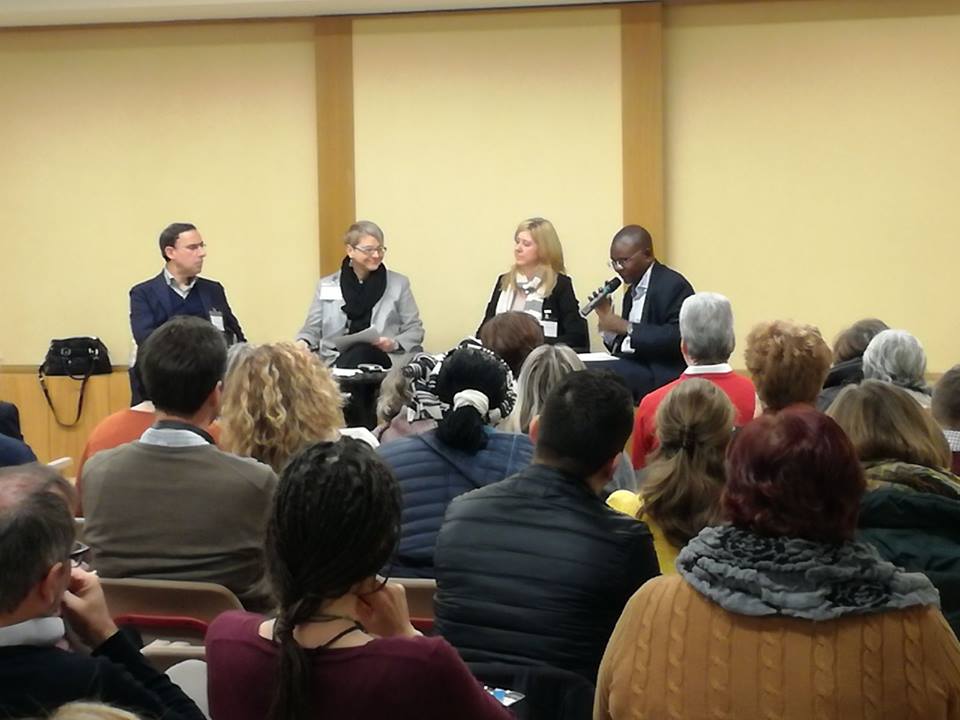 In the same way, it isn’t easy to launch good procedures and practices in the field of the battle against illegal management of public funds. Françoise, French officer in the Ministry of Finance, recounts: “Due to the variety of situations, public services and issues which I have to deal with, it is not always easy to maintain one’s discernment, define the law, sustain good management practices or simply coherence with the principles of honesty (also intellectual), rectitude, cooperation and solidarity with colleagues. But the work experience over the years has confirmed that every time I was faithful to these values, I discovered new horizons, new ways of acting, the situations got solved and unity between institutions and people was possible.” Paolo, director at the Municipality of a big Italian city added: “We mustn’t forget that as public administration employees our primary task is to dedicate ourselves to the good of the community under all aspects, taking on the weight of the related responsibility. Every action must conform to the principles and values without which we couldn’t live together, enhancing human wellbeing and progress of all the citizens.” It is the battle against corruption, therefore, but not only that. The diffusion of good practices, respect for the rights of citizens and their needs, and also reception, and the capacity to create a link with other institutions: these are the great challenges for those working in the Public Administration. The participants of the congress are all convinced of this, and have made it their commitment to continue cultivating these principles daily. The seeds of a culture of lawfulness will silently bring about results in their countries.
In the same way, it isn’t easy to launch good procedures and practices in the field of the battle against illegal management of public funds. Françoise, French officer in the Ministry of Finance, recounts: “Due to the variety of situations, public services and issues which I have to deal with, it is not always easy to maintain one’s discernment, define the law, sustain good management practices or simply coherence with the principles of honesty (also intellectual), rectitude, cooperation and solidarity with colleagues. But the work experience over the years has confirmed that every time I was faithful to these values, I discovered new horizons, new ways of acting, the situations got solved and unity between institutions and people was possible.” Paolo, director at the Municipality of a big Italian city added: “We mustn’t forget that as public administration employees our primary task is to dedicate ourselves to the good of the community under all aspects, taking on the weight of the related responsibility. Every action must conform to the principles and values without which we couldn’t live together, enhancing human wellbeing and progress of all the citizens.” It is the battle against corruption, therefore, but not only that. The diffusion of good practices, respect for the rights of citizens and their needs, and also reception, and the capacity to create a link with other institutions: these are the great challenges for those working in the Public Administration. The participants of the congress are all convinced of this, and have made it their commitment to continue cultivating these principles daily. The seeds of a culture of lawfulness will silently bring about results in their countries.

Dec 14, 2017 | Focolare Worldwide
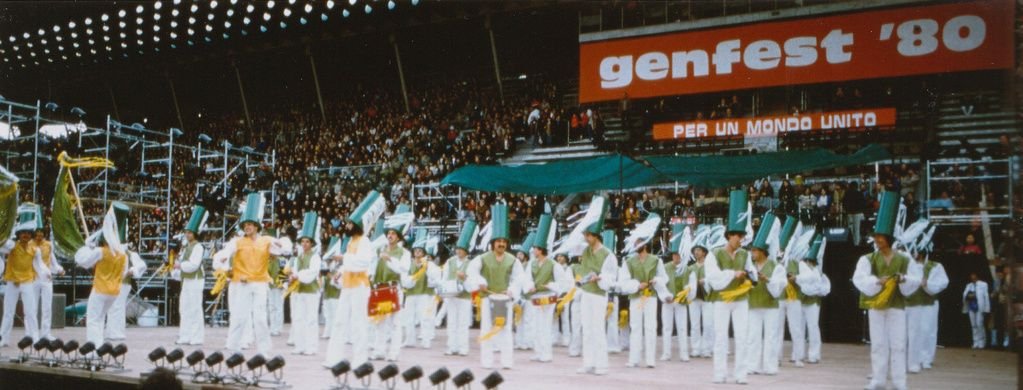 I was born in Bergamo,(Italy), the first of four children in a beautiful family with solid Christian roots. At seventeen I was in high school and involved in the parish. I loved school, helping others and going on trips to the mountains. I had a lot of friends and a rich faith experience. As they used to say back then, I was “good kid,” but … I always felt something was missing. I wanted something beautiful, great and true. Italy was going through hard times with assassination attempts by the Red Brigades and a job crisis. My father who was in metalworking, was laid off and later lost his job. The injustice of it all bothered me, as did the social conflict, but I also could feel being made to renew society. I spent hours talking with friends, debating, but it only left me empty inside.
I was born in Bergamo,(Italy), the first of four children in a beautiful family with solid Christian roots. At seventeen I was in high school and involved in the parish. I loved school, helping others and going on trips to the mountains. I had a lot of friends and a rich faith experience. As they used to say back then, I was “good kid,” but … I always felt something was missing. I wanted something beautiful, great and true. Italy was going through hard times with assassination attempts by the Red Brigades and a job crisis. My father who was in metalworking, was laid off and later lost his job. The injustice of it all bothered me, as did the social conflict, but I also could feel being made to renew society. I spent hours talking with friends, debating, but it only left me empty inside. 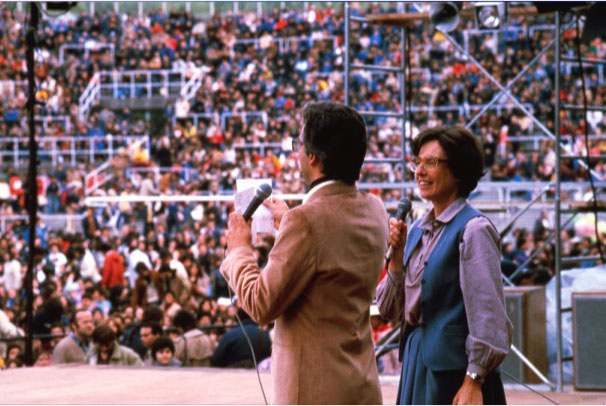 One day, Anita, a girl from the parish, invited me and my sister to the Genfest that was going to be held in Rome. She told me we’d meet thousands of young people from other countries and also the Pope. There was something special about Anita, a special joy and sincerity that shone in her eyes and, like others at the parish – the priest, two catechists and a seminarian – she seemed to have a secret: they were always open to everyone, willing and really able to listen. With a good dose of unawareness my sister and I took off on a bus with a hundred young people from the parish and headed for the Genfest in Rome. We arrived late at the Flaminio Stadium because of an accident and wound up sitting in the last rows on the highest seats where there was no roof – and we were very far from the stage that had a sign that read: For A United World. It was pouring rain, and I was drenched. I began to ask myself why I had ever agreed to such an excursion. But just then some young people from Switzerland who were sitting just below us, offered us some plastic sheeting to cover ourselves with; they offered us some food and binoculars, so we could follow the show more easily. We spoke in different languages, but understood one another right away. I experienced the liberty of love freely given, and a great sense of welcome and acceptance. Despite all the rain, colorful dances took turns on stage. It seemed like I had stepped into another dimension. Forty-thousand young people filled with enthusiasm were flowing in from every corner of the world – all of them giving witness to the Gospel they were really living.
One day, Anita, a girl from the parish, invited me and my sister to the Genfest that was going to be held in Rome. She told me we’d meet thousands of young people from other countries and also the Pope. There was something special about Anita, a special joy and sincerity that shone in her eyes and, like others at the parish – the priest, two catechists and a seminarian – she seemed to have a secret: they were always open to everyone, willing and really able to listen. With a good dose of unawareness my sister and I took off on a bus with a hundred young people from the parish and headed for the Genfest in Rome. We arrived late at the Flaminio Stadium because of an accident and wound up sitting in the last rows on the highest seats where there was no roof – and we were very far from the stage that had a sign that read: For A United World. It was pouring rain, and I was drenched. I began to ask myself why I had ever agreed to such an excursion. But just then some young people from Switzerland who were sitting just below us, offered us some plastic sheeting to cover ourselves with; they offered us some food and binoculars, so we could follow the show more easily. We spoke in different languages, but understood one another right away. I experienced the liberty of love freely given, and a great sense of welcome and acceptance. Despite all the rain, colorful dances took turns on stage. It seemed like I had stepped into another dimension. Forty-thousand young people filled with enthusiasm were flowing in from every corner of the world – all of them giving witness to the Gospel they were really living. 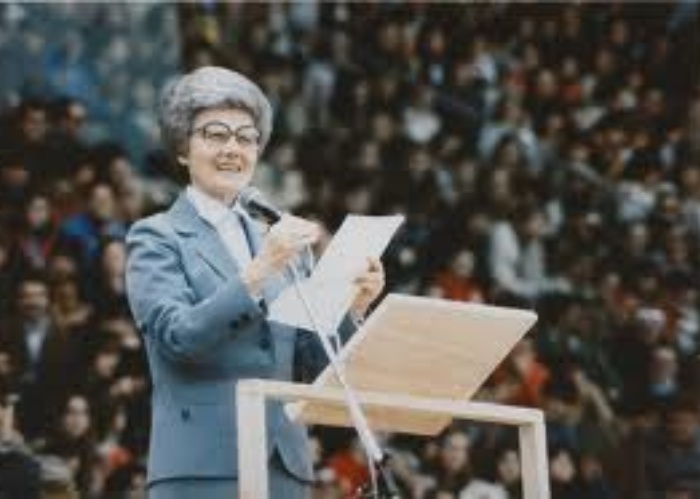 Then a small woman with white hair got on stage. It was Chiara Lubich. I looked at her through binoculars. As soon as she began to speak a deep silence fell over the crowd. I was enraptured more by the sound of her voice than by what she said, by the conviction that emanated from her words, by their power that stood in contrast to her fragile appearance. She spoke of a “moment of God,” and, even though she presented several lists of divisions, breakups and the overall disunity of the human race – she was proclaiming a great ideal: a united world, Jesus’s own ideal. She invited us to bring the divine into the life of society, into the world – through love. Her talk only lasted a few minutes while I found myself being crushed by a feeling I had never had before, which – afterwards – no sorrowful nor difficult event could ever dent in: a united world is possible and I have the amazing possibility of building it with my own life! I had found it! I wanted to live like Chiara, like those young people I was among that afternoon, to have their faith, their push, their joy.
Then a small woman with white hair got on stage. It was Chiara Lubich. I looked at her through binoculars. As soon as she began to speak a deep silence fell over the crowd. I was enraptured more by the sound of her voice than by what she said, by the conviction that emanated from her words, by their power that stood in contrast to her fragile appearance. She spoke of a “moment of God,” and, even though she presented several lists of divisions, breakups and the overall disunity of the human race – she was proclaiming a great ideal: a united world, Jesus’s own ideal. She invited us to bring the divine into the life of society, into the world – through love. Her talk only lasted a few minutes while I found myself being crushed by a feeling I had never had before, which – afterwards – no sorrowful nor difficult event could ever dent in: a united world is possible and I have the amazing possibility of building it with my own life! I had found it! I wanted to live like Chiara, like those young people I was among that afternoon, to have their faith, their push, their joy. 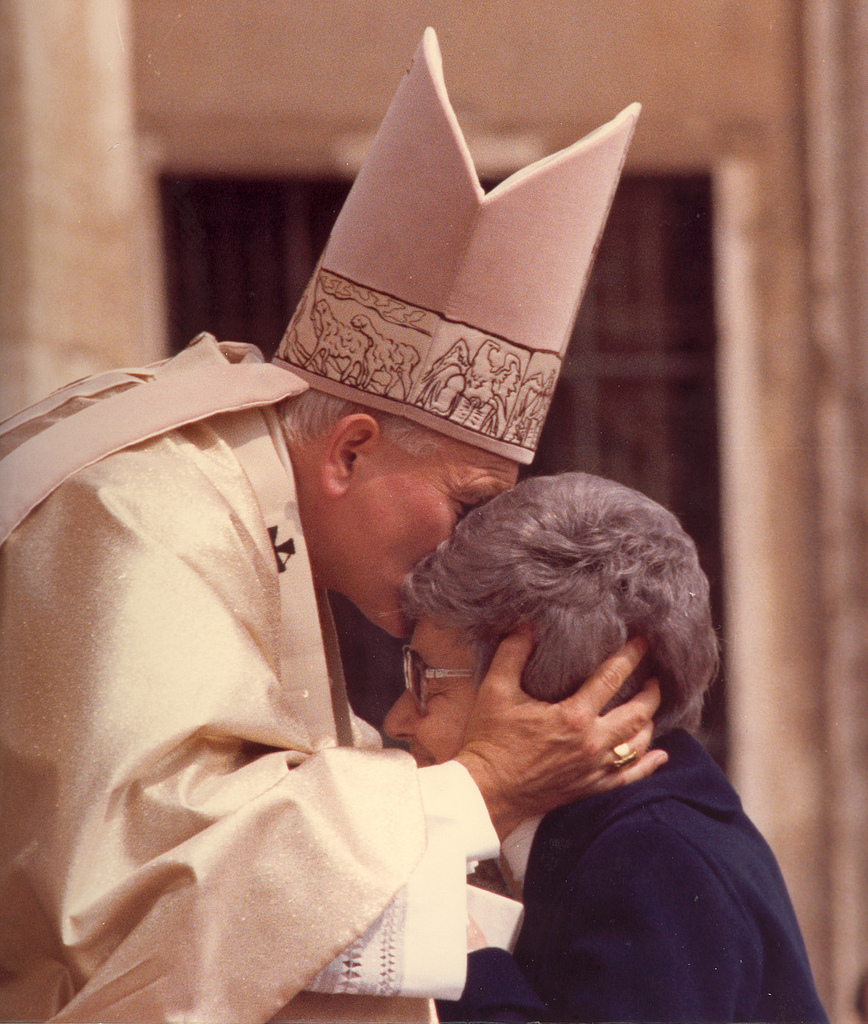 The next day there was a rousing encounter with John Paul II at Saint Peter’s Square. During the return trip home, me – timid as I am – I bombarded the Gen with questions: I wanted to know everything about them! I began to visit them in my city, and the Gen talked to me about their secret: love for Jesus Forsaken in all the large and small sufferings in us and around us. I somehow realized that this was a radical experience of God I was dealing with here, one without half-measures. Jesus Forsaken was calling me to give Him everything, to follow Him. I was filled with an enormous fear: for me it me it was ALL or NOTHING. Strong suffering and pain were never lacking in the months following the Genfest. But the life I had begun with the Gen, the possibility of giving a meaning to pain, the unity among us that was made of concrete love and sharing, helped me to carry on, in spite of every obstacle – in an amazing adventure that widened my heart. I was experiencing that with God among us, all is possible and that the possibility of the unity of the human family was really doable.
The next day there was a rousing encounter with John Paul II at Saint Peter’s Square. During the return trip home, me – timid as I am – I bombarded the Gen with questions: I wanted to know everything about them! I began to visit them in my city, and the Gen talked to me about their secret: love for Jesus Forsaken in all the large and small sufferings in us and around us. I somehow realized that this was a radical experience of God I was dealing with here, one without half-measures. Jesus Forsaken was calling me to give Him everything, to follow Him. I was filled with an enormous fear: for me it me it was ALL or NOTHING. Strong suffering and pain were never lacking in the months following the Genfest. But the life I had begun with the Gen, the possibility of giving a meaning to pain, the unity among us that was made of concrete love and sharing, helped me to carry on, in spite of every obstacle – in an amazing adventure that widened my heart. I was experiencing that with God among us, all is possible and that the possibility of the unity of the human family was really doable.
Patrizia Bertoncello













